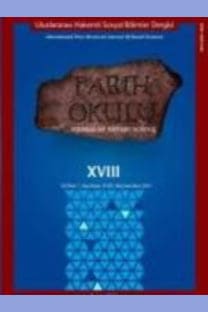İMPARATOR TİBERİUS YÖNETİMİNİN ROMA EDEBİYATI ÜZERİNDEKİ ETKİSİ: DAVALAR, SÜRGÜNLER VE İDAMLAR
The Influence of the Emperor Tiberius Rule on Roman Literature: Lawsuits, Exiles, and Executions
___
- Appianos, Bellum Civile. (Appian’s Civil Wars, transl. by H.White). vols. I-IV. Loeb. 1972.
- Dio Cassius, Historia Romana. (Dio’s Roman History, Eng. transl. by E. Cary). Loeb. 1914.
- Justinus, Cornelius Nepos and Eutropius. (transl. by J.S.Watson). Loeb. 1853.
- Sallust, Florus and Velleius Paterculus. (ed. & transl. by J.S. Watson). Harpr’s Classical Library. 1888.
- Seneca, Ad Lucilium Epistulae Morales. volume 1-3 (ed. R. M. Gummere). Harvard University Press. 1917-1925.
- Seneca The Elder, Controversiae. (ed. A.G. Kiessling). 1872.
- Suetonius, Oniki Caesarın Yaşamı. (çev. F. Telatar-G. Özaktürk).Türk Tarih Kurumu Yayınları. 2008.
- Tacitus, Annales. (transl. by A.J. Woodman). Loeb. 2004.
- Ovidius, Aşk Sanatı. (Art Amor, Lat. çev. Ç. Dürüşken). Türkiye İş Bankası Kültür Yayınları. 2010.
- Plinius, Letters. (transl. by W. Melmoth). Loeb. 1931.
- Plutarkhos, Bioi Paralelloi. ( Plurach’s Lives, transl. by B. Perin). Loeb. 1932, 1961, 1967.
- Demiriş, B. (2009). Roma edebiyatı: Başlangıcı, sınırları, özellikleri. Doğu-Batı Dergisi, 49, 107-124.
- Faulkner, N. (2015). Roma: Kartallarının İmparatorluğu. (çev. Ç. Sümer). Yordam Kitap.
- Fear, T. (2010). Interdictiones Dome et Ingenio: Timagenes and Propertius: A Reading in The Dynamics of Augustan Exclusion.John Hopkins University Press, pp. 428-438.
- Griffin, J. (2007). Augustan Poetry and Augustanism, in: Age of Augustus. Cambridge University Press, pp.306-320
- Knox, P.E. (2004). The Poet and the second prince: Ovid in the age of Tiberius. Memoirs of the American Academy in Rome, 49, 1-20.
- Scullard H. H. (1986). From Gracchi to Nero, A History of Rome from 133 B.C. to A.D. 68.
- Wiedemann, T.E. (2008). Tiberius to Nero, in: Cambridge Ancient History, X, 198–255.
- White, P. (2007). Poets in The new milie: Realigning, in: Age of Augustus. Cambridge University Press, pp. 321-339.
- ISSN: 1308-5298
- Yayın Aralığı: 6
- Başlangıç: 2008
- Yayıncı: Ahmet KARA
Özgür KARATAŞ, Tugay YILMAZ, Buğra Çağatay SAVAŞ
BEDEN EĞİTİMİ ÖĞRETMENLERİNİN SINIF YÖNETİMİ ÜZERİNE NİTEL BİR İNCELEME
Emine ÖZTÜRK KARATAŞ, Mehmet GÜLLÜ
2020 DİLLER İÇİN AVRUPA ORTAK ÇERÇEVE METNİ’NDE (CEFR) DİNLEME BECERİSİ: ÖLÇEKLER VE KAZANIMLAR
Talat AYTAN, Ayşegül GÖKSEL, Yusuf GÜNAYDIN
URSING STUDENTS' ATTITUDES TOWARDS THE ELDERLY AND AFFECTING FACTORS
TÜRK KAMU YÖNETİMİ MÜFREDATININ E-DEVLET YETERLİLİKLERİNE GÖRE DEĞERLENDİRİLMESİ
TÜKETİM KÜLTÜRÜ BAĞLAMINDA REKLAMLARDA KADIN VE ERKEK İMGESİ
HÂREZMŞÂHLAR DÖNEMİNDE SİYASÎ İLİŞKİLERİN HAZİNE GELİRLERİNE TESİRİ
